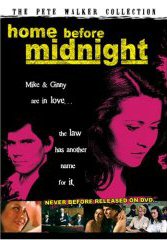
A pioneer of the perverted set-piece and culturally damning attacks against the status quo, director Pete Walker began charting the dark byways of horror during a time when the genre was still devoted to the 'polite' terrors of the House of Hammer and the monster parodies of Amicus. Walker injected wicked pertinence and timely controversy into admittedly scandalous flesh and blood shows. Making Britain bleed, Walker's surprisingly violent and sexually explicit exploitation titles kick-started a stagnant British genre. But as moodily photographed and disturbing as Walker's films are, celebrating violent death, madness, and the struggle of incompetent characters to survive insurmountable odds, the most impressive element of his work remain the philosophical outrage rooted deep in splattery subversive themes. This impressive attention to disturbing moral ambiguity, and his resistance of the moral majority, is recast in a new, intriguing manner in the non-horror film Home Before Midnight. If not as engaging, shocking, or enjoyable as the psychological horror films that one wishes he had kept making, this coming-of-age social drama of love and lust and hypocrisy is nevertheless a fine example of Walker's evolving talent as a filmmaker, and worthy of your attention.
Walker will be remembered primarily for their harsh condemnation of abused political power, religious fanaticism, and the breakdown of family, and each of these themes is present in Home Before Midnight. Both a cautionary tale and tragic romance, this oddly romantic yet undeniably tragic love story centers on Mike Beresford (James Aubrey), who one morning makes the fateful decision to pick up an attractive young hitchhiker Ginny Wilshire (Alison Elliott). They establish a date for later in the evening, where he woes her with his influence and show business savvy, leading to sex that itself promises to be real emotional love . . . And then spirals into a shit storm. Mike discovers that Ginny is only 14 (OOOPS!), and that the sex he so thoroughly enjoyed is, well, illegal. Ginny's parents discover the illicit relationship and call the police, with the expected nightmarish results. Michael is charged with rape as the story behind the relationship gets blown out of proportion, and what started off innocent enough becomes a shit storm of misery and condemnation.
Fresh from the somewhat similarly themed The Comeback (at least whereas an aging media personality/power figure is beset by relationship woes), Walker and writing partner Murray Smith decided to frame a narrative on the coat-tails of recent media events in Britain - one that just so happens to still be a subject of controversy. Along the way they also tackled such themes as the loosing one's identity, the tarnishing of one's good name, loss of career, and the threatened loss of freedom. That these may be lost through an accident, mistake, or worse yet, misinformation, is the true emotional terror of the piece. The result is a dramatically involving expose of culpability and fate, mistakes and betrayal . . . With 'love' lost in the courtroom. The new cinematic age of social relevance that Walker brought to the horror genre also lends emotional and political substance to Home Before Midnight. This is clearly not one for genre fans, though. Devoted to cultural criticism, not sensationalism, the few moments of sexual explicitness are far from enticing. Rather they are carefully cultivated to draw more meaning to the sombre themes of/problems of under age sex/romance, with no easy answers. This is a somewhat new side to Walker's approach on the surface, but while the story focuses on drama rather than horror, one clearly sees a culmination of the director's rage against political and social oppression - something that remained constant throughout his entire career.
Home Before Midnight is presented in clean 1.85:1 anamorphic edition. While a few moments of grain and other blemishes show up, the overall print is polished, and the colors vibrant. Audio in English Mono is serviceable. Extras for this human interest story include a 'Video Interview" with director Walker, wherein he discusses (again!) his dislike of where the horror genre was headed, and other interesting trivia regarding the film and its casting. A generous Still Gallery is next, followed by Trailers for Walker's better known and rightly celebrated poems to perversity.
Review by William P. Simmons
| Released by Shriek Show |
| Region 1 - NTSC |
| Not Rated |
| Extras : |
| see main review |